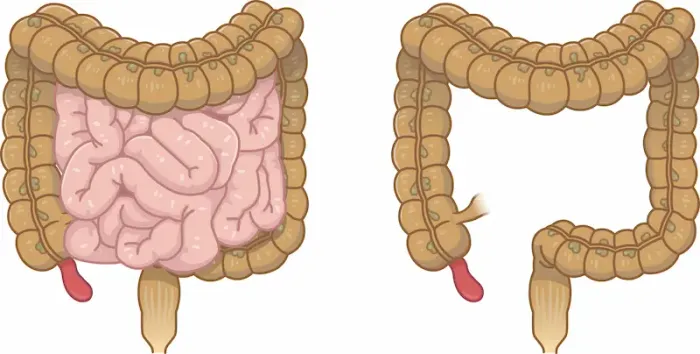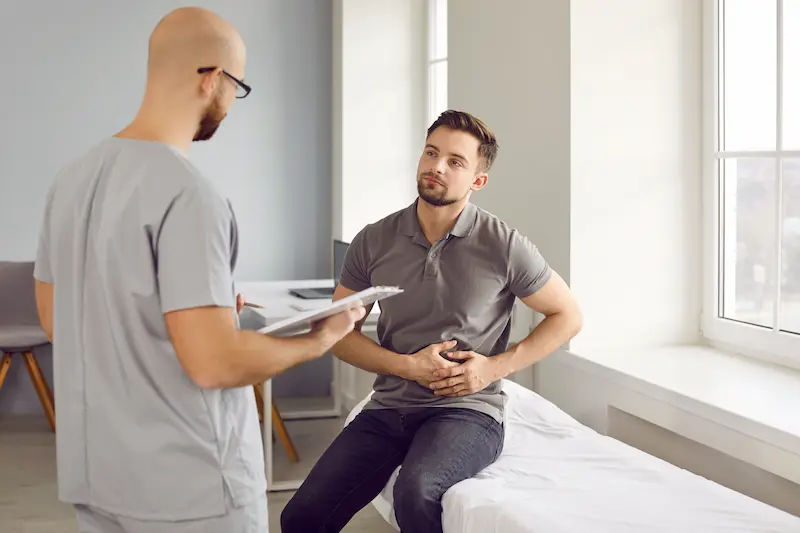Understanding Appendicitis Symptoms, Causes, and Treatment
Know about appendicitis, symptoms, causes, symptoms, risk factors, diagnosis and treatment options. Learn about the prevention and recovery after surgery.

Written by Dr. J T Hema Pratima
Reviewed by Dr. Dhankecha Mayank Dineshbhai MBBS
Last updated on 29th Aug, 2025

Introduction
Appendicitis is a common yet serious medical condition that requires prompt attention. If left untreated, it can lead to severe complications. This article will help you understand what appendicitis is, its symptoms, causes, and available treatments in simple, easy-to-understand terms.
What is Appendicitis?
The appendix is a small, finger-shaped pouch attached to the large intestine. Appendicitis occurs when this pouch becomes inflamed, usually due to a blockage caused by stool, infection, or other factors. If not treated quickly, an inflamed appendix can burst, leading to a dangerous infection in the abdomen.
Consult a Gastrointestinal Specialist for Personalised Advice
Common Symptoms of Appendicitis
Recognising the signs of appendicitis early can prevent complications. The most common symptoms include:
1. Abdominal Pain – The pain usually starts near the belly button and then moves to the lower right side of the abdomen. It worsens over time, especially with movement or coughing.
2. Loss of Appetite – You may feel no desire to eat, even if you haven’t eaten for a while.
3. Nausea and Vomiting – Feeling sick to your stomach and throwing up may occur after the pain starts.
4. Fever – A mild fever (around 99-100°F) may develop as the inflammation worsens.
5. Bloating and Gas – You may feel unusually bloated or gassy.
6. Diarrhoea or Constipation – Some people experience changes in bowel movements.
Note: If the appendix ruptures, symptoms may temporarily improve before worsening again with severe infection (peritonitis). Seek emergency care immediately if you suspect appendicitis.
What Causes Appendicitis?
The exact cause is not always clear, but common reasons include:
• Blockage – Hardened stool, swollen lymph nodes, or parasites can block the appendix.
• Infection – Bacterial or viral infections in the digestive tract can lead to swelling.
• Inflammation – Conditions like Crohn’s disease may increase the risk.
Who is at Risk?
Appendicitis can happen to anyone, but it is most common in people between the ages of 10 and 30. Other risk factors include:
• A family history of appendicitis
• A diet low in fibre
• Chronic digestive issues
How is Appendicitis Diagnosed?
Doctors use several methods to diagnose appendicitis:
1. Physical Exam – Pressing on the abdomen to check for pain.
2. Blood Tests – To check for infection (high white blood cell count).
3. Urine Test – To rule out urinary tract infections or kidney stones.
4. Imaging Tests – Ultrasound or CT scans to confirm inflammation.
If you experience severe abdominal pain, do not delay—visit a doctor immediately.
Get Your Health Assessed
The standard treatment for appendicitis is surgery (appendectomy), which removes the inflamed appendix before it ruptures. There are two types:
1. Laparoscopic Surgery – A minimally invasive procedure with small incisions and faster recovery.
2. Open Surgery – Used in severe cases (ruptured appendix) and requires a larger incision.
In some mild cases, doctors may prescribe antibiotics first, but surgery is often necessary to prevent recurrence.
Recovery After Surgery
Most people recover within 2-4 weeks after surgery. Here’s how to speed up recovery:
• Rest – Avoid heavy lifting or strenuous activities for a few weeks.
• Eat Light – Start with bland foods (broth, toast) and gradually return to a normal diet.
• Stay Hydrated – Drink plenty of water to aid healing.
• Follow Doctor’s Advice – Take prescribed medications and attend follow-up visits.
Can Appendicitis Be Prevented?
While there’s no guaranteed way to prevent appendicitis, you can reduce the risk by:
• Eating a high-fibre diet (fruits, vegetables, whole grains) to prevent blockages.
• Staying hydrated to keep digestion smooth.
• Seeking prompt care for persistent stomach pain.
When to See a Doctor?
If you or a loved one experiences:
• Severe, worsening abdominal pain
• Fever with nausea/vomiting
• Sudden relief of pain followed by worsening symptoms (possible rupture)
Do not wait—seek emergency medical help immediately.
Final Thoughts
Appendicitis is a serious but treatable condition. Recognising symptoms early and seeking medical help can prevent complications. If you experience persistent abdominal pain, don’t ignore it—consult a doctor right away.
Consult a Gastrointestinal Specialist for Personalised Advice
Consult a Gastrointestinal Specialist for Personalised Advice

Dr Bhargav Vuppumalla
General Physician/ Internal Medicine Specialist
5 Years • MBBS MD GENERAL MEDICINE
Bengaluru
Apollo Medical Center, Marathahalli, Bengaluru

Dr Harish K C
Gastroenterology/gi Medicine Specialist
15 Years • MBBS MD DM MRCP(UK) (SCE-Gastroenterology and Hepatology)
Bangalore
Manipal Hospital, Bangalore

Dr. Shivaraj Afzalpurkar
Gastroenterology/gi Medicine Specialist
13 Years • MBBS, MD General medicine (Gold medalist), DrNB (Gastroenterology), MNAMS
Bengaluru
Apollo Clinic, JP nagar, Bengaluru

Dr. Paramesh K N
Gastroenterology/gi Medicine Specialist
16 Years • MBBS, MS ( General Surgery), DNB ( Surgical Gastroenterology)
Hyderabad
Sprint Diagnostics Centre, Hyderabad

Dr. Amit Pandita
Gastroenterology/gi Medicine Specialist
10 Years • MBBS. MD (INTERNAL MEDICINE) DrNB (GASTROENTEROLOGY AND HEPATOLOGY)
Delhi
Apollo Hospitals Indraprastha, Delhi
Consult a Gastrointestinal Specialist for Personalised Advice

Dr Bhargav Vuppumalla
General Physician/ Internal Medicine Specialist
5 Years • MBBS MD GENERAL MEDICINE
Bengaluru
Apollo Medical Center, Marathahalli, Bengaluru

Dr Harish K C
Gastroenterology/gi Medicine Specialist
15 Years • MBBS MD DM MRCP(UK) (SCE-Gastroenterology and Hepatology)
Bangalore
Manipal Hospital, Bangalore

Dr. Shivaraj Afzalpurkar
Gastroenterology/gi Medicine Specialist
13 Years • MBBS, MD General medicine (Gold medalist), DrNB (Gastroenterology), MNAMS
Bengaluru
Apollo Clinic, JP nagar, Bengaluru

Dr. Paramesh K N
Gastroenterology/gi Medicine Specialist
16 Years • MBBS, MS ( General Surgery), DNB ( Surgical Gastroenterology)
Hyderabad
Sprint Diagnostics Centre, Hyderabad

Dr. Amit Pandita
Gastroenterology/gi Medicine Specialist
10 Years • MBBS. MD (INTERNAL MEDICINE) DrNB (GASTROENTEROLOGY AND HEPATOLOGY)
Delhi
Apollo Hospitals Indraprastha, Delhi




.webp)